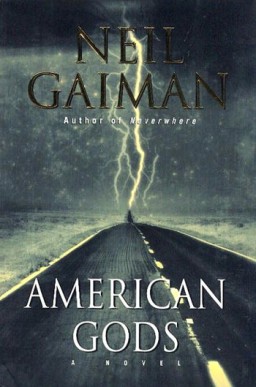In its meandering ways, American Gods is an underwhelming behemoth of a novel. Neil Gaiman himself is a god in the fantasy writing world. His writing is magic and he has written some fantastic pieces of fiction, both in novel and graphic novel form. His voice is also a work of art. He deserves a spot up there with Morgan Freeman and Werner Herzog in creating magic with that voice. While reading American Gods, I couldn't help but hear how his voice might pronounce phrases, the way he might pause, or the way he might stress certain words. And yet Neil Gaiman is not a god (and I'm not implying that he thinks he's one, either). While others may treat him as a god whose pen turns everything he writes into gold, he does misfire now and then, and American Gods is one of those misfires.
Halfway into my reading of American Gods, I was puzzled by my inability to appreciate the work as others had. Despite the praise I had both heard and read, I was bored. I wasn't engaged. The humor was lacking or muted. The characters, none of them, were particularly well-drawn. Shadow is a nothing of a character, somebody who has things happen to him and who does what he is told. Shadow is not unlike the main character from The Ocean at the End of the Lane, about whom I also had the same complaint. This work never quite develops a fully coherent plot, nor does it provide itself with much of a purpose. It feels like it should be deep in purpose, but whenever I try to grasp for it, I come up with nothing. Too many of the travels and plot events end up going nowhere.
Perhaps part of my problem was that I didn't care. I didn't care about the gods. I didn't care about Shadow and what happened with his wife. The gods, and Shadow's wife, turn out to be very unlikeable, and I think that's on purpose. But the gods are the biggest problem. Gaiman is probably trying to say something profound by showing all the gods from all over the world who have come to America at some point or another and have been forgotten. The question is, is it bad that they are forgotten? Is this saying something about America? Is there a critique somewhere in there? I mean, there are plenty of gods who are no longer worshiped. Along with the Norse gods like Odin and Loki and Thor, there are the Roman gods such as Zeus and Athena, and the Greek gods. What is Gaiman trying to get at? I couldn't grasp it.
The other problem comes down to the idea that there is a conflict between the new gods and the old gods. The new gods are gods of internet and television and whatnot. How are those gods? Where do you draw the line? Gaiman suggests that where people used to sacrifice living things to gods, people now sacrifice time. So shouldn't everything that we sacrifice time to be a god? I spent a lot of time reading this book. Do books have a god? Do commutes to work have a god? Does work itself have a god? School? Studying? Vehicles? Zoos? Parks? And on the same line as the previous paragraph, is Gaiman providing a critique in this conflict? The problem was that I spent time attempting to see his larger point, and every attempt I made grasped at straws. People may just say I don't get it, and I can't say I disagree with that. I don't get it. When it comes down to a conflict between gods, I didn't care. The gods were not human enough and whatever they were trying to symbolize is not convincing enough.
Gaiman has proven himself to be a great meanderer. The Graveyard Book is an excellent example of his meandering, and in that book it works. It's fascinating the way he creates a world and brings it to life. In American Gods, though, his meandering merely muddles his world. I get a feeling of fatigue, of searching for purpose. Gaiman has also proved that he can write terrific stories with clear plots. Neverwhere played to Gaiman's best strengths with humor, well-developed characters, and villains who were both amusing and terrifying. In American Gods, anytime Gaiman seems to be getting somewhere, the novel gets stuck in a rut. His villains aren't particularly interesting or scary, and his gods are mostly terrible people, too much to care about. Wednesday charms teenage girls into having sex with him and tricks hardworking people out of their money. Another god swallows men with her vagina. The gods seem more like villains than people we should root for, and I wasn't sure what Gaiman wanted his readers to think.
One consistent thing I saw in reviews, is that if this was written by anyone other than Gaiman, such and such a reviewer probably would have enjoyed the novel more. This doesn't make sense except to elevate Gaiman to that status of a god. It's as if to say that he is such a god that an inferior work written by him would be an excellent work written by another, lesser writer. American Gods would have been as meandering as it is no matter who wrote it, but it might not have seen the same praise. But because this is a Gaiman work, there is some enjoyment to be had. There are moments that do work, where the reading is pleasant even if the purpose is unclear. That said, I would still have trouble recommending this to anyone but a Gaiman fan, or a fan of mythology. Others may find themselves thinking Gaiman is overrated, and they would be wrong. This simply is not one of his better works, in my mind.

No comments:
Post a Comment